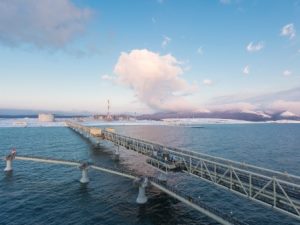The parties addressed a variety of issues relating to the strategic cooperation between Gazprom and Shell. Touching upon the Sakhalin II project, the parties highly appreciated the progress with its implementation. It was noted that in 2015 liquefied natural gas production within the project had totaled 10.8 million tons, exceeding the design capacity of the LNG plant by 1.2 million tons.
The meeting also discussed the LNG plant expansion related activities. At present, the FEED of its third train is ongoing. It was highlighted that the experience gained during the implementation of the Sakhalin II project, one of the most successful LNG projects worldwide, would be fully taken into account in future joint projects of Gazprom and Shell.
Particular attention was given to the Nord Stream 2 project. The parties noted that in light of the declining European gas production, the construction of this gas pipeline was crucial for meeting the growing Russian gas demand in Europe in the future.
The parties also discussed issues concerning a swap of assets.
Shell is a British-Dutch oil and gas company focused on hydrocarbon production, processing and marketing in over 70 countries worldwide.
In 2009 a liquefied natural gas plant with an annual capacity of 9.6 million tons was brought into operation as part of the Sakhalin II project. It is the only LNG plant in Russia. The Sakhalin II operator is Sakhalin Energy Investment Company Ltd. (Gazprom – 50 per cent plus one share, Shell – 27.5 per cent minus one share, Mitsui – 12.5 per cent and Mitsubishi – 10 per cent).
On June 18, 2015 Gazprom and Shell signed a Memorandum to construct the third production train of the LNG plant within Sakhalin II.
On June 18, 2015 Gazprom and Shell signed an Agreement of Strategic Cooperation promoting the partnership between the two companies across all the segments of the gas industry, from upstream to downstream, including in the form of a potential swap of assets.
On September 4, 2015 Gazprom, BASF, E.ON, ENGIE, OMV and Shell signed a Shareholders Agreement to build the Nord Stream 2 gas pipeline system with an annual capacity of 55 billion cubic meters from Russia to Germany across the Baltic Sea.
01 Марта 2026 | воскресенье | 06:08


